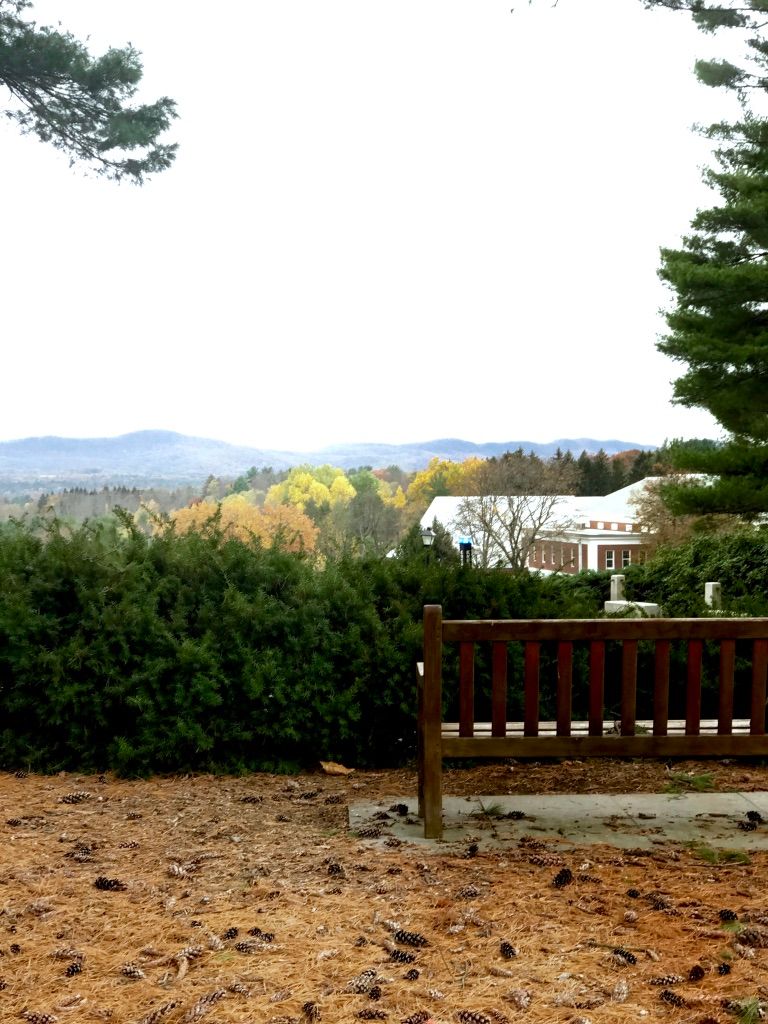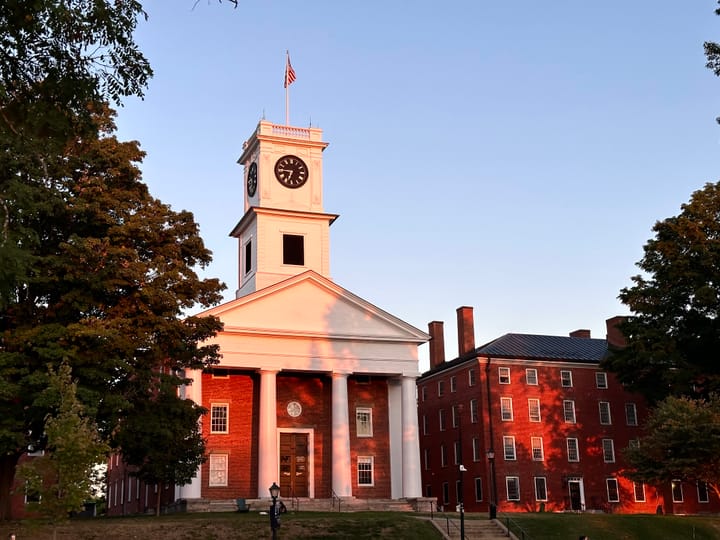What Do We Know About Fall 2020? Looking Ahead of the July 1 Announcement

With the college approaching a final decision on operations for the fall 2020 semester, the administration has nodded to a number of potential shifts through emails to the community, Q&A sessions with donors and other modes of communication. Though July 1 — the date around which the college expected to announce its plans — looms, little is still known as students attempt to piece together the already-disclosed details at hand.
Colleges across the country are scrambling to prepare for a potential resurgence in coronavirus cases during the fall 2020 semester, and NESCAC schools are no exception. Four of the eleven NESCAC schools have announced their intention to hold classes in-person; five plan to have a hybrid model, a mix of online and in-person learning; one plans to have remote, online classes and another is undecided as of June 26.
On June 15, Wesleyan University announced that it hopes to bring back most students, faculty and staff to Middletown in late August, provided that numerous health-related protocols will be in place. Bowdoin plans to only allow first-year and transfer students to return, along with some upperclassmen who successfully petition, and Middlebury is welcoming all students back to campus so long as they are tested and quarantined, with courses available in both remote, in-person and hybrid settings.
As campus awaits next week’s announcement, here is everything we know so far.
Returning Students to Campus
In an email to faculty on June 11 titled “Teaching in the Fall,” President Biddy Martin and Provost and Dean of Faculty Catherine Epstein assured that the college has acquired enough coronavirus testing from The Broad Institute, based out of the Massachusetts Institute of Technology, to return at least some students to campus.
“The Broad Institute’s ability to provide adequate testing makes us more confident than we have been at any other point that we will be able to bring students to campus. We do not yet know how many, but everyone is working hard, with the best available guidance, to reach a decision,” the email said. “In addition to easily administered testing, contact tracing, classrooms set up for social distancing, the opportunity to teach out of doors, the wearing of masks, and students‘ commitment to these and other measures, we are doing everything possible to make the campus environment as safe as any can be.”
Academic Schedule
Among the expected changes to the fall semester include an adjustment to the academic calendar, Epstein confirmed in an email to students on June 18 after the faculty approved of the plan in a meeting on June 9. The semester will run from August 24 through Thanksgiving break, with finals and reading period held remotely after the break. All classes may be taken remotely if students choose, and the typical course load will be three classes per semester, though students may take four with the consent of their advisor.
To make up for the potentially reduced course load, the number of courses required to graduate has been lowered from 32 to 30.
Though the semester will be 15 weeks long including finals and reading period, there will be 13 weeks of instruction. There will be no fall break, either.
“We don’t want students to travel elsewhere over breaks and then come right back to campus. When away from campus, students might get exposure to Covid-19, and we’d like to prevent that,” Epstein said.
Courses will be designated as either “remote,” in which all class activity will occur over Zoom and other digital platforms, or “hyflex,” in which faculty prepare their courses so that students can take them whether or not they are on campus.
Even without an announcement about the fall, Epstein noted that faculty may want to teach remotely due to health conditions that may put them at increased risk for Covid-19 complications, a lack of child care or other reasons.
Many faculty are also spending the summer participating in training programs to learn how to enhance online teaching strategies, as Martin wrote in a June 25 email survey that provided more details about fall planning and aimed to gauge student opinion on their plans to return. To do so, the college has partnered with an online education company, 2U.
In addition to a reduced course load, students may also take an additional four-week course during January term, regardless of how many classes they took during the fall semester and with no additional cost. The classes will be taught intensively and remotely, with more hours of class time per week, Epstein said. The course offering list for the January term has not yet been released. Re-registration for both fall and January classes will occur in mid-July.
January term offerings may be geared towards contemporary issues including Covid-19 and Black Lives Matter, Martin said in a town hall with members of the 1821 Society on June 18.
The 1821 Society comprises a select group of donors who donate between $1,821 and $2,499 to the college per year. The Student confirmed details shared during the town hall with two other attendees.
An FAQ about the updated academic schedule also notes that “a number of faculty are preparing new and topical courses exploring the pandemic, and race and racism in the United States.”
The FAQ addressed other student concerns, including reduced tuition for a reduced course load. In response to the question “Shouldn’t tuition be lower because the college is encouraging students to take three courses per semester?”, the FAQ responded, “No. No student will be required to take a lower course load than they would otherwise wish and be able to take.”
“We have listened to feedback we received from students, and these one-time changes for the 2020-21 academic year are simply about creating options for our students during these unprecedented times, allowing them to craft an academic experience that works best for them,” the FAQ continued.
Shortly following Epstein’s announcement on the remodeled academic schedule, an FAQ was added to the college’s Covid-19 webpage to answer questions about the shift.
Epstein’s committee on academic planning considered the so-called “Beloit academic model” for the upcoming semester, but faculty members generally opposed. Beloit, a liberal arts college in Wisconsin, previously announced that it would break its regular fall semester into modules, in which students take two courses in seven-and-a-half week sections. The intense teaching would maximize course learning if a second wave of Covid-19 disrupts the fall 2020 semester earlier than expected.
Campus Logistics
To reduce the spread of Covid-19, the college purchased 20 outdoor tents to hold classes in and has planned to improve ventilation in buildings. Additionally, classes with at least 35 students will be held remotely entirely, regardless of whether the students are available on campus. Remote instruction will be provided for students who are unable to be on campus due to personal circumstances.
“Based on our hope and planning to have students return to campus in the fall, the preparation of campus buildings and grounds will accelerate over the next few weeks. That work includes, among many other projects, the installation of tents for outside teaching and social activities, modifications to interior spaces to enhance safety, work in the library to facilitate collection distribution, the establishment of new dining services pickup locations, and the technical enhancement of classrooms,” Martin wrote in a planning update to faculty and staff on June 16.
The June 2 planning update to students also outlined several health precautions that will be undertaken by the college for the fall 2020 semester. The Campus Operations committee, sponsored by Jim Brassord, chief of campus operations, is developing “plans for a redesigned food service model with grab-and-go satellite facilities, a robust campus cleanliness and hygiene plan, redesigned classrooms in collaboration with the registrar, buffer-capacity housing for isolation and quarantine, all necessary PPE and supplies, enhanced HVAC air flow in campus buildings and the design and installation of physical barriers to promote social distancing.” As of June 25, the college has also posted four new job openings for medical doctors and nurses, along with a contact tracing manager
Valentine Dining Hall may be replaced by five grab-and-go locations, administrators said in the 1821 Society town hall. The college is also considering partnering with local restaurants in town to provide grab-and-go meal options.
A survey sent Dean of Admission & Financial Aid Matthew McGann to the student body to evaluate students’ opinions on coming back to Amherst stated that students must consent to social distancing, limiting large social gatherings, frequent COVID-19 testing, wearing of masks, contact tracing and the possibility of temporary isolation and quarantine should a positive test result occur.
Student Life
The most recent email survey to students from the president’s office, dated June 25, outlined more specific plans at what student life beyond the classroom may look like, asking students to adhere to responsible health and distancing practices while still trying to preserve the unique attributes of a residential college.
To do so, the college will largely rely on utilizing the outdoor tents and additional Adirondack chairs it has purchased for socializing, studying, exercising and similar parts of life that are essential to college students but not captured in the academic day. The college also plans to host sets of speaker series and panel discussions, largely online.
Masks, social distancing, and no large gatherings all “are a must,” the survey stated, though it did not elaborate on how it would enforce and define large social gatherings.
Students will live in dorms with lower density for lower student-to-bathroom ratios and will all live in single rooms. If a student tests positive for the virus, they will need to isolate in a specified residence hall or room at the Inn on Boltwood.
In an email obtained by The Student, Martin noted that the college will “almost certainly choose to have all students in singles and to have a student to bathroom ratio of seven to one. There are between 1,200 and 1,300 single rooms on campus, though Martin noted that the seven to one ratio, the development of a quarantine dorm, staffing capacity and general campus density will decrease the number of students the college can bring to campus.
“I don’t know which classes will return if we proceed [to bring students back] by class year,” Martin said in the email, though most “institutions are giving priority to first-year students.”
Students will be asked to self-monitor and report symptoms and participate in frequent asymptomatic testing.
“It will require that you assume a great deal of responsibility … We know that the residential experience at Amherst is special and we also know that you seek a total learning experience that covers a broad set of interests, activities, social life, emotional development, and more,” the survey outlines. “Deciding to study on campus will be an important exercise in solidarity of each one of you with others in the community.”
If students fail to follow the college’s guidelines, they will be dismissed from on-campus learning and required to continue the semester remotely.
The college will reveal its final plans regarding the fall 2020 semester around July 1. This article will continue to be updated as information is released prior to the official announcement.





Comments ()